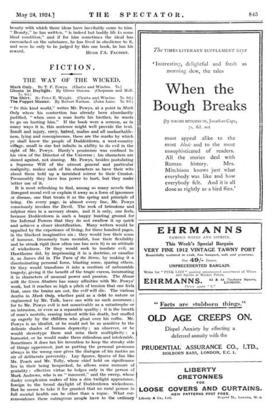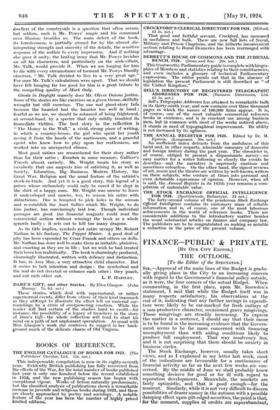FICTION.
THE WAY OF THE WICKED.
"IN this kind world," writes Mr. Powys, at a point in Mark Only where his contention has already been abundantly
justified, "when once a man hurts his brother, he wants to go on hurting him." If the book were a sermon, as in
many ways it is, this sentence might well provide the text. Insult and injury, envy, hatred, malice and all uncharitable- ness, lying and concupiscence, these are the marks by which
ye shall know the people of Dodderdown, a west-country village, small in size but infinite in ability to do evil in the
sight of Mr. Powys. Hardy's pessimism was confined to his view. of the Director of the Universe ; his characters are sinned against, not sinning. Mr. Powys, besides postulating
a Supreme Will of the utmost general and particular malignity, makes such of his characters as have their wits about them hold up a tarnished mirror to their Creator.
Presumably they have less power to hurt, but they make better use of it.
It is most refreshing to find, among so many novels that lisregard moral evil or explain it away as a form of ignorance or disease, one that treats it as the spring and principle of being. On every page, in almost every line, Mr. Powys consciously invokes the Devil. The reek of brimstone and sulphur rises in a savoury steam, and it is only, one feels, because Dodderdown is such a happy hunting ground for the Infernal Powers that they do not swallow it up quick and achieve a closer identification. Many writers would be appalled by the experience of living, for three hundred pages, in the blackest imaginative sin ; they would lose their sense of humour, tiresomely turn moralist, lose their flexibility and be struck rigid (how often one has seen it) in an attitude of wickedness. Or they would seek to insulate evil, as Hawthorne did, by imprisoning it in a doctrine, or canalize
it, as James did in The Turn of the Screw, by making it a discriminating personal force, blasting some, sparing others. Or they would transform it into a medium of unbearable tragedy, giving it the benefit of the tragic excess, incarnating it in characters of unusual power and passion. The House with the Green Shutters has many affinities with Mr. Powys' work, but it reaches so high a pitch of tension that one feels that, once the brains are out, the evil will die. The various deaths in Mark On/y, whether paid as a debt to nature or engineered by Mr. Tulk, leave one with no such assurance ; for to Mr. Powys evil is not conceivable as a catastrophe or
an intrusion, or even as a separable quality ; it is the breath of man's nostrils, ceasing indeed with:his death, but snuffed up eagerly by the children who gloat over his coffin. Mr. Powys is an idealist, or he could not be so sensitive to the delicate shades of human depravity ; an observer, or he
would stereotype them and miss their multiplicity ; a humorist, or he would make them ridiculous and intolerable.
Sometimes it does tax his invention to keep the streaky side of things uppermost, just as putting the personal pronouns always in the wrong case gives the dialogue of his rustics an air of deliberate perversity. Lay figures, figures of fun like Mr. Peach and Mr. Tolly, whose chief hold on significance lies in their being henpecked, he allows some measure of geniality ; effective virtue he lodges only in the person of Mark Andrews, who is an "innocent," and the sweep, whose dusky complexion makes of him a dim twilight appearance, foreign to the broad daylight of Dodderdown wickedness. But he seems to take it for granted that no tarn' person in full mental health can be other than a rogue. What cor- resnondence these outrageous people have to the ordinary dwellers of the countryside is a question that often occurs, but seldom, such is Mr. Powys' magic and his command over illusion, troubles us. The main defect of the book, its formlessness, is partially atoned for by the almost dis- integrating strength and sincerity of the details, the sensitive response of the author to every impression. And if nothing else gave it unity, the healing irony that Mr. Powys lavishes on all his characters, and particularly on the arch-villain,
Mr. Tulk, would provide it. When we are longing for him to die with every circumstance of torment Mr. Powys blandly observes, "Mr. Tulk decided to live to a very great age." For once Mr. Tulk's calculations were upset. That we should have felt hanging far too good for him is a great tribute to the compelling quality of Mark Only.
Ghosts in Daylight scarcely does Mr. Oliver Onions justice. Some of the stories are like exercises on a given theme, skilfully wrought but still exercises. The one real ghost-story fails
because the haunted had the haunter too well in hand ; fearful as we are, we should be ashamed of being frightened,
at second-hand, by a spectre that only mildly troubled its immediate victims. The best story in the collection is "The Honey in the Wall," a vivid, strong piece of writing,
in which a country-house, the girl who spent her youth saving it from the hands of the auctioneers, and a graceful egoist who knew how to play upon her restlessness, are worked into an unexpected climax.
Most good satires are remembered for their story rather than for their satire ; Erezvhon in some measure, Gulliver's Travels almost entirely. Mr. Wright treats his story so cavalierly that one suspects him of satirizing it, as well as
Society, Education, Big Business, Modern History, the Great War, Religion and the usual feature of the satirist's stock-in-trade. And yet it is a good story, this legend of a prince whose melancholy could only be cured if he slept in the shirt of a happy man. Mr. Wright was unwise to leave it undeveloped and unwise, too, to season his satire with didacticism. One is tempted to pick holes in the sermon and re-establish the Aunt Sallies which Mr. Wright, to do him justice, has convincingly laid low. Though individual passages are good (no financial magnate could read the commercial section without wincing) the book as a whole sprawls badly ; it sets out to kill too many dragons.
As its title implies, symbols not satire occupy Mr. Robert Nathan in his fantasy, The Puppet Master. A good deal of
pity has been expended by Cesar Franck and others on dolls. Mr. Nathan has done well to make them as irritable, plaintive, and exacting as they are in life ; but we wish he had treated their loves less realistically. The book is charmingly produced, charmingly illustrated, written with delicacy and distinction. It has, in Amy May, a very attractive child character. But it seems to lack intention and design : the symbolical and the real do not dovetail or enhance each other : they poach,











































 Previous page
Previous page